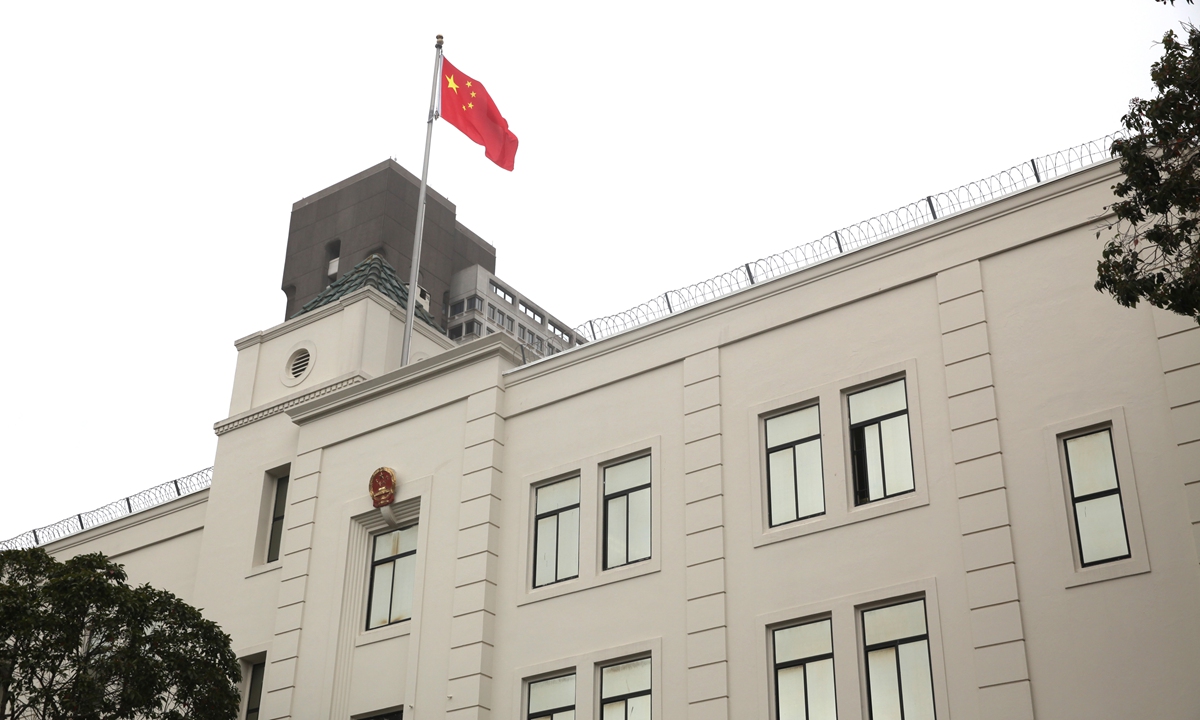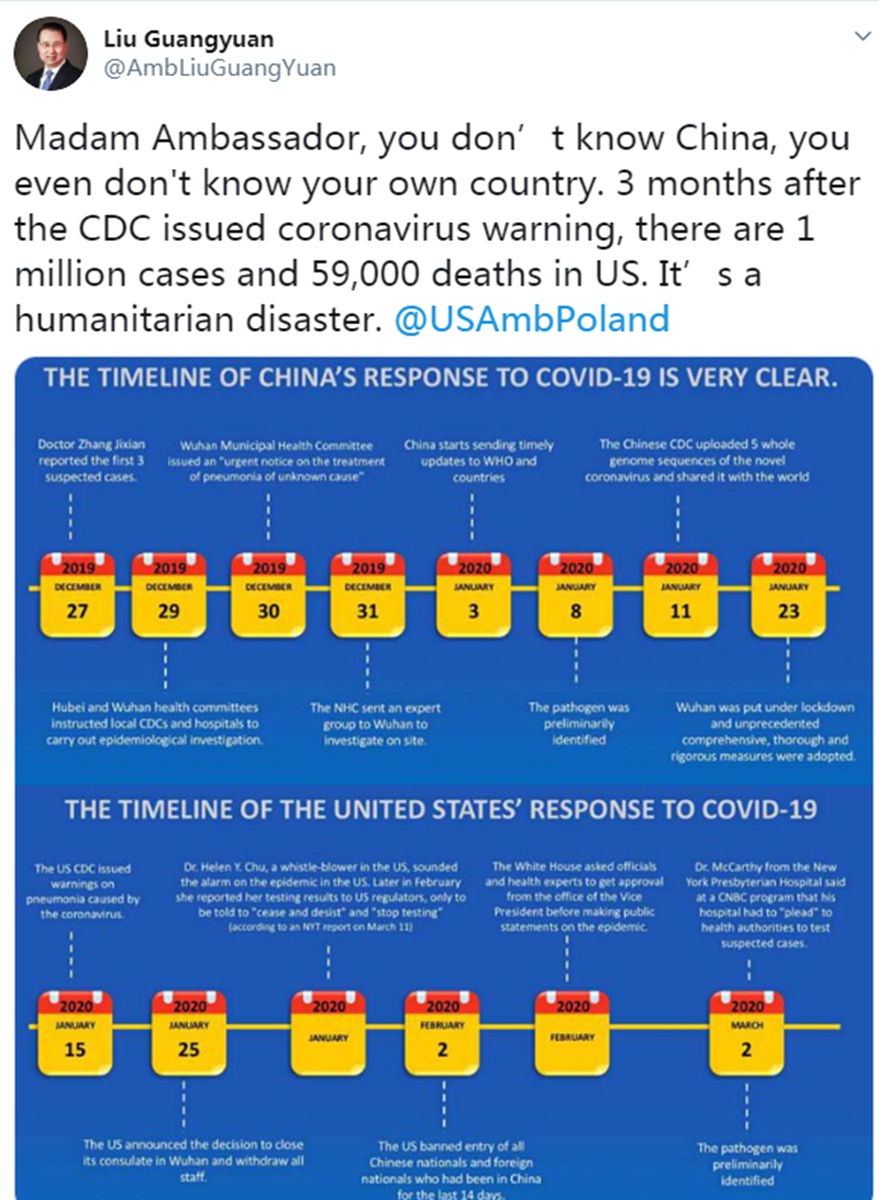Chinese diplomats overseas counter the bashing, slander by US counterparts

Consulate General of China in San Francisco, California Photo: AFP
The US demanding the closure of the Chinese Consulate General in Houston shocked the world for demonstrating its Cold War mentality and antagonism against China.
Apart from persecuting the Chinese consulate, the US has used its embassies and diplomats in countries around the world to ramp up containment of China. The US has meddled in other countries' relations with China and attempted to smear China through fear-mongering about COVID-19 and 5G.
Chinese diplomats around the world said they have to confront accusations and interruptions from their US counterparts, when developing relations with foreign governments and people. Such interactions have grown in intensity this year as US diplomats attempt to smear China thoroughly in other countries.
The recent peak of these encounters occurred in Mid-July when George Sibley, a US diplomat in Myanmar, published an anti-China article. The Chinese embassy spokesperson in Myanmar pointed out in a statement that the US has been pursuing the so-called America First policy, and that the US ignores international ethics and legal norms, disregards the common interests of mankind and international trends, and has done a lot of despicable things.
The Chinese Embassy in Belgium on Saturday published a statement demanding the US immediately stop the smear and slander on cybersecurity issues. Previously, some media in Belgium cited US accusations to claim China was "stealing secrets."
Cyberspace should not become the new battlefield, read the statement. "Those who seek for online hegemony with 'aggressive network strategy' would only hurt themselves."
Fighting back
Diplomatic problems between China and the US have been previously seen in many other countries with Chinese diplomats refuting US groundless accusations with abundant preparation and evidence.
Poland, a major country in Eastern Europe, became a "battlefield" to counter US attacks.
Since March, US Ambassador to Poland Georgette Mosbacher has been spreading misinformation to smear China regarding COVID-19 and 5G via articles on Polish media, interviews and Twitter.
Her allegations have not gone unanswered. Chinese Ambassador Liu Guangyuan opened a Twitter account in March and has posted almost 300 tweets as of press time, many of which were in response to US accusations.
During information battles with US diplomats, Liu told his employees that "we do not shoot first, but we must shoot the last gunshot. We will not hold back until we gain complete victory."
The Chinese embassy told the Global Times they have been keeping close contact with Polish local government departments to make full efforts to safeguard Chinese companies' legal rights. The embassy has been in frequent communication with many sectors of Polish society, gaining understanding and support from locals.
The engagements drew the attention of media in Poland, China and the US. The Diplomat commented Mosbacher "rarely misses an opportunity to criticize the Chinese side... The emerging media feud between the US and Chinese ambassadors to Poland is a sign that the war of words between the two superpowers continues to escalate dramatically."
Alice Wells, former Acting Assistant Secretary of State for South and Central Asian Affairs of the US, has attacked Belt and Road projects like the China-Pakistan Economic Corridor (CPEC), calling the initiative a "debt trap."
Before the 5th CPEC Media Forum in November 2019, Wells "warned" Pakistan the CPEC would only benefit China, and the US could provide a better path. Her words were later refuted by both China and Pakistan. At the forum, Chinese Ambassador to Pakistan Yao Jing introduced the latest developments in the CPEC's progress.
"Wells talked about the CPEC in public and listed many ridiculous views, which surprised me. I talked to Ms. Wells twice in Pakistan face to face, and I introduced the CPEC to her, but it seemed she did not listen carefully, but complained it was 'not transparent'," Yao said in a public speech in 2019.
With only some hearsay, Wells has made irresponsible comments on China-Pakistan cooperation, Yao said.
Even before resigning in May, Wells did not miss a chance to smear the CPEC. "Her zero-sum and Cold War mentality is rude interference against the CPEC and China-Pakistan ties," said Yao.
Dangerous mentality
The US' China policy is of a "whole-government style," which means the US conducts all-around attacks on China to demonize and marginalize China, Li Haidong, a professor at the Institute of International Relations of the China Foreign Affairs University, told the Global Times on Monday.
The "whole-government" policy that attacks China covers not only the Department of State, but also the US' Department of Defense and CIA, the FBI, as well as its education and justice departments, Li said, noting that US diplomatic attacks on China are wide-ranging.
"Recent event shows Trump's team, on policies related to China, have no bottom line," Li said. "Trump would engage China to US' domestic politics in order to add votes to his potential reelection, which is surprisingly disgusting."
Li noted the US attempts to prove that "the Communist Party of China is not a legal party in power in China, and the country's overseas projects do not accord with international laws… It is dangerous for China."

Screenshot of Chinese Ambassador Liu Guangyuan's tweet Photo: Chinese Embassy in Poland
Battle of Warsaw: Chinese ambassador to Poland smashes US counterpart's waves of smears
On March 23, US Ambassador to Poland Georgette Mosbacher published an article on one of Poland's largest websites ONET, accusing China of concealing facts about COVID-19. The article embellished the US government's active devotion in international aid and cooperation.
Chinese Ambassador Liu Guangyuan fought back immediately the next day on the same website by publishing an article clarifying the facts. The ambassador also tweeted his opinions of the article mentioning Mosbacher.
Liu's reaction showed Chinese diplomats�? firm stance of spreading facts and protecting China's national image. After the article and tweets, the US ambassador stayed quiet for a while.
2. Sniping action: April
On April 29, Mosbacher slandered the Chinese social system and achievements in tackling the epidemic on Twitter.
In 10 days, Chinese Ambassador Liu posted 32 tweets refuting Mosbacher's speeches, quoting facts, experts and statistics.
The tweets were read 200,000 times and got 40,000 comments, reposts and likes. Many Polish netizens commented the US should work with China on developing vaccines, instead of accusing China and blaming others.
3. War of annihilation: May
The third wave of provocations came on May 11. The US ambassador posted to slander Chinese virus prevention work. She also reposted Mike Pompeo's anti-China speeches.
Ambassador Liu then posted 25 tweets and an article on ONET, slamming US behavior and underlining the cooperation of China and Poland's cooperation on virus prevention.
4. Battle of 5G: July
In early July, the US ambassador to Poland posted on Twitter, calling the 5G technology of Chinese companies not reliable.
Facing the smears, Chinese Ambassador Liu published 17 tweets, arguing the US, using its national power to suppress Chinese companies without evidence, is pursuing technological hegemony and violating the principles of free market and fair play.
Chinese companies had never violated local laws, and have gained their status with their own efforts and investment. He also published similar articles on Polish news websites and newspapers.
Newspaper headline: Setting the record straight